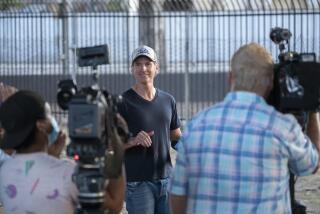Youth Service Plan Will Start Small : Jobs: Clinton’s first step will be a community employment project for 1,800 young people. A larger effort is in the works.
- Share via
WASHINGTON — The only part of President Clinton’s ambitious new national service program that would begin this year is a small community employment project that will put 1,800 young people to work this summer, The Times learned Friday.
The initiative, to be announced by Clinton on Monday, is his first move toward fulfilling a campaign promise to give young people a chance to do important work for society, restore a sense of civic spirit and earn tuition for college at the same time.
The small scale of the maiden project illustrates the real-life challenges the Administration faces in meeting some of Clinton’s campaign themes. By rolling out a program this summer, Clinton clearly hopes to demonstrate a commitment to a national service program even though a full-scale effort may not be in place before the fall of 1994.
Youths participating in the project this summer would help needy children in up to 10 urban and rural areas by providing services such as assisting health care providers with immunizations, helping children learn to read, tutoring teen-agers who are at risk of dropping out of school and testing buildings for lead paint.
In exchange, the workers would earn minimum wage, plus $1,000 to be applied to education or training.
Under Clinton’s initiative, which requires the approval of Congress, the government would also provide some funds for another 2,600 summer community service jobs for people aged 17 to 23. However, those workers would not receive the education and training stipend.
The budget for the summer programs will be $15 million, according to an Administration document obtained by The Times, an amount far smaller than those for summer jobs programs that the federal and state governments already offer.
The Clinton team is at work on the broader national service program that will cost at least $5.8 billion over four years and is to be presented to Congress in the next few weeks, according to Diana Aldridge, spokeswoman for the Administration’s new national service office.
Funding for the full-scale program would represent an unprecedented commitment to national service programs by the federal government.
“We’re not used to getting $5.8 billion,” said Roger Landrum, executive director of Youth Service America, a alliance of community service projects nationwide. “We’re all worried it’s going to be too much money too fast.”
The 1993 summer program provides clues to what a Clinton-style national service program will look like. By targeting a national service effort to meet the needs of “at-risk children,” the President clearly indicates that he intends to use the program to achieve results in other parts of his domestic agenda.
Clinton’s national service initiative would be “very focused” on major national priorities so that it will have a “measurable impact,” said Landrum, who met with Clinton’s national service team Friday to discuss the summer program and agreed to comment on it only after learning that the Times was already aware of its details.
Funding for the 1,800 jobs this summer would be limited to programs that can provide slots for at least 50 participants. The money will go to no fewer than four but no more than 10 urban and rural areas. The programs would begin with a weeklong “leadership boot camp,” followed by at least eight weeks of work.
The cost, $5,890 per participant for a little more than two months of service, indicates that Clinton’s national service agenda will carry a heavy price tag. The President plans to meet with all the students at a gathering at the end of the summer. In addition to those funds, Clinton’s initiative would contribute up to $500 per participant for 2,000 existing summer service programs, and $1.2 million would be granted to create about 600 new summer positions with VISTA, an existing federally funded service program.
Another $250,000 would be allocated to train elementary and secondary schoolteachers to design and administer programs in their schools.
National service was Clinton’s most reliable applause line during the campaign, and it has elicited a strong grass-roots response since the election.
“I’ve noticed an increasing number of students getting involved in community service already,” said David McKnight, 20, a junior sociology major at Rutgers University, where Clinton will unveil the summer project in a domestic policy speech Monday. “I’m sure that with the President’s support of community service and civic responsibility, interest will keep spreading.”
McKnight works as a volunteer at the Adult Learning Center of New Brunswick, N.J., which the President is scheduled to visit, and has been asked to conduct a class with high school dropouts during Clinton’s tour.
More to Read
Sign up for Essential California
The most important California stories and recommendations in your inbox every morning.
You may occasionally receive promotional content from the Los Angeles Times.













